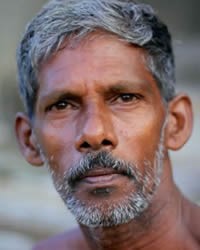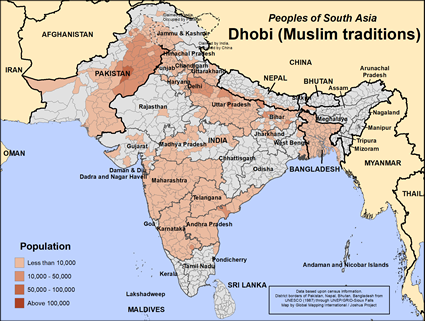The Dhobi are a large collective community of India, Pakistan, Bangladesh and Nepal. They derive their name from the Sanskrit term dahv which means 'wash '. The Dhobi are traditionally the clothes washers. They are a schedule caste in many of the states of India, where most of the Dhobi live. A majority of the Muslim Dhobi live in Pakistan.
Today more than most South Asian communities the Dhobi have maintained their traditional occupation of washing clothes and running laundry services. Yet they are struggling; washing machines are replacing them even in Muslim Pakistan.
These Dhobi people are Sunni Muslims who believe that the supreme God, Allah, spoke through his prophet, Mohammed, and taught mankind how to live a righteous life through the Koran and the Hadith. To live a righteous life, you must utter the Shahada (a statement of faith), pray five times a day facing Mecca, fast from sunup to sundown during the month of Ramadan, give alms to the poor, and make a pilgrimage to Mecca if you have the means. Muslims are prohibited from drinking alcohol, eating pork, gambling, stealing, slandering, and making idols. They gather for corporate prayer on Friday afternoons at a mosque, their place of worship.
The two main holidays for Sunni Muslims are Eid al Fitr, the breaking of the monthly fast and Eid al Adha, the celebration of Abraham's willingness to sacrifice his son to Allah.
Sunni religious practices are staid and simple. They believe that Allah has pre-determined our fates; they minimize free will.
In most of the Muslim world, people depend on the spirit world for their daily needs since they regard Allah as too distant. Allah may determine their eternal salvation, but the spirits determine how well we live in our daily lives. For that reason, they must appease the spirits. They often use charms and amulets to help them with spiritual forces.
Though some small success has come in ministry to the Hindu Dhobi, the Muslim Dhobi have no known work among them in Pakistan. In general, the attitude of the Dhobi to education is quite good and literacy in some locations is higher than other Muslim communities. May the Lord use education to bringing many Muslim Dhobi in Pakistan to faith.
Pray for the Muslim Dhobi culture to be renewed and enhanced by a work of the Holy Spirit and shaped into a God-centered and God-honoring mold.
Pray for the Holy Spirit to move among their family and community leaders to seek his face and enjoy his blessings.
Pray for the Lord to thrust out workers who will be compelled to nurture a Disciple Making Movement among the Dhobi people.
Pray that soon the Muslim Dhobi people will have faith that will lead them to live honorable lives that will draw others to the savior.
Scripture Prayers for the Dhobi (Muslim traditions) in Pakistan.
| Profile Source: Joshua Project |











